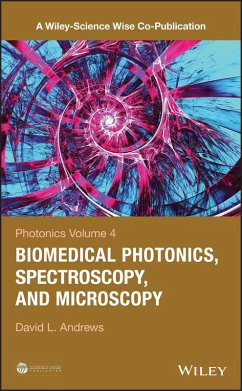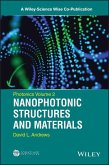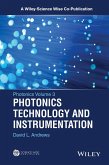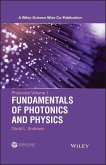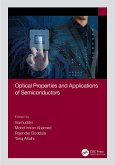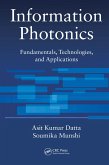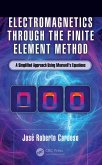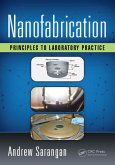127,99 €
127,99 €
inkl. MwSt.
Sofort per Download lieferbar

0 °P sammeln
127,99 €
Als Download kaufen

127,99 €
inkl. MwSt.
Sofort per Download lieferbar

0 °P sammeln
Jetzt verschenken
Alle Infos zum eBook verschenken
127,99 €
inkl. MwSt.
Sofort per Download lieferbar
Alle Infos zum eBook verschenken

0 °P sammeln
- Format: ePub
- Merkliste
- Auf die Merkliste
- Bewerten Bewerten
- Teilen
- Produkt teilen
- Produkterinnerung
- Produkterinnerung

Bitte loggen Sie sich zunächst in Ihr Kundenkonto ein oder registrieren Sie sich bei
bücher.de, um das eBook-Abo tolino select nutzen zu können.
Hier können Sie sich einloggen
Hier können Sie sich einloggen
Sie sind bereits eingeloggt. Klicken Sie auf 2. tolino select Abo, um fortzufahren.

Bitte loggen Sie sich zunächst in Ihr Kundenkonto ein oder registrieren Sie sich bei bücher.de, um das eBook-Abo tolino select nutzen zu können.
Discusses the basic physical principles underlying Biomedical Photonics, spectroscopy and microscopy
This volume discusses biomedical photonics, spectroscopy and microscopy, the basic physical principles underlying the technology and its applications. The topics discussed in this volume are: Biophotonics; Fluorescence and Phosphorescence; Medical Photonics; Microscopy; Nonlinear Optics; Ophthalmic Technology; Optical Tomography; Optofluidics; Photodynamic Therapy; Image Processing; Imaging Systems; Sensors; Single Molecule Detection; Futurology in Photonics.
Comprehensive and accessible…mehr
- Geräte: eReader
- ohne Kopierschutz
- eBook Hilfe
Andere Kunden interessierten sich auch für
![Photonics, Volume 2 (eBook, ePUB) Photonics, Volume 2 (eBook, ePUB)]() David L. AndrewsPhotonics, Volume 2 (eBook, ePUB)127,99 €
David L. AndrewsPhotonics, Volume 2 (eBook, ePUB)127,99 €![Photonics, Volume 3 (eBook, ePUB) Photonics, Volume 3 (eBook, ePUB)]() David L. AndrewsPhotonics, Volume 3 (eBook, ePUB)127,99 €
David L. AndrewsPhotonics, Volume 3 (eBook, ePUB)127,99 €![Photonics, Volume 1 (eBook, ePUB) Photonics, Volume 1 (eBook, ePUB)]() David L. AndrewsPhotonics, Volume 1 (eBook, ePUB)127,99 €
David L. AndrewsPhotonics, Volume 1 (eBook, ePUB)127,99 €![Optical Properties and Applications of Semiconductors (eBook, ePUB) Optical Properties and Applications of Semiconductors (eBook, ePUB)]() Optical Properties and Applications of Semiconductors (eBook, ePUB)54,95 €
Optical Properties and Applications of Semiconductors (eBook, ePUB)54,95 €![Information Photonics (eBook, ePUB) Information Photonics (eBook, ePUB)]() Asit Kumar DattaInformation Photonics (eBook, ePUB)51,95 €
Asit Kumar DattaInformation Photonics (eBook, ePUB)51,95 €![Electromagnetics through the Finite Element Method (eBook, ePUB) Electromagnetics through the Finite Element Method (eBook, ePUB)]() José Roberto CardosoElectromagnetics through the Finite Element Method (eBook, ePUB)57,95 €
José Roberto CardosoElectromagnetics through the Finite Element Method (eBook, ePUB)57,95 €![Nanofabrication (eBook, ePUB) Nanofabrication (eBook, ePUB)]() Andrew SaranganNanofabrication (eBook, ePUB)55,95 €
Andrew SaranganNanofabrication (eBook, ePUB)55,95 €-
-
-
Discusses the basic physical principles underlying Biomedical Photonics, spectroscopy and microscopy
This volume discusses biomedical photonics, spectroscopy and microscopy, the basic physical principles underlying the technology and its applications. The topics discussed in this volume are: Biophotonics; Fluorescence and Phosphorescence; Medical Photonics; Microscopy; Nonlinear Optics; Ophthalmic Technology; Optical Tomography; Optofluidics; Photodynamic Therapy; Image Processing; Imaging Systems; Sensors; Single Molecule Detection; Futurology in Photonics.
Written for the graduate level student in physical sciences; Industrial and academic researchers in photonics, graduate students in the area; College lecturers, educators, policymakers, consultants, Scientific and technical libraries, government laboratories, NIH.
This volume discusses biomedical photonics, spectroscopy and microscopy, the basic physical principles underlying the technology and its applications. The topics discussed in this volume are: Biophotonics; Fluorescence and Phosphorescence; Medical Photonics; Microscopy; Nonlinear Optics; Ophthalmic Technology; Optical Tomography; Optofluidics; Photodynamic Therapy; Image Processing; Imaging Systems; Sensors; Single Molecule Detection; Futurology in Photonics.
- Comprehensive and accessible coverage of the whole of modern photonics
- Emphasizes processes and applications that specifically exploit photon attributes of light
- Deals with the rapidly advancing area of modern optics
- Chapters are written by top scientists in their field
Written for the graduate level student in physical sciences; Industrial and academic researchers in photonics, graduate students in the area; College lecturers, educators, policymakers, consultants, Scientific and technical libraries, government laboratories, NIH.
Dieser Download kann aus rechtlichen Gründen nur mit Rechnungsadresse in D ausgeliefert werden.
Produktdetails
- Produktdetails
- Verlag: Wiley-Blackwell
- Erscheinungstermin: 27. Februar 2015
- Englisch
- ISBN-13: 9781119011798
- Artikelnr.: 42507208
- Verlag: Wiley-Blackwell
- Erscheinungstermin: 27. Februar 2015
- Englisch
- ISBN-13: 9781119011798
- Artikelnr.: 42507208
- Herstellerkennzeichnung Die Herstellerinformationen sind derzeit nicht verfügbar.
DAVID L. ANDREWS leads research on fundamental molecular photonics and energy transport, optomechanical forces, and nonlinear optical phenomena. He has over 300 research papers and a dozen of books to his name¿including the widely adopted textbook, Lasers in Chemistry. The current focus of his research group is on optical vortices, novel mechanisms for optical nanomanipulation and switching, and light harvesting in nanostructured molecular systems. The group enjoys strong international links, particularly with groups in Canada, Lithuania, New Zealand, and the United States. Andrews is a Fellow of the Royal Society of Chemistry, a Fellow of the Institute of Physics, and a Fellow of SPIE, the international society for optics and photonics.
List of Contributors ix
Preface xiii
1 Fluorescence 1
David J. S. Birch, Yu Chen, and Olaf J. Rolinski
1.1 Introduction 1
1.2 Spectra 2
1.3 Quantum Yield 6
1.4 Lifetime 12
1.5 Quenching 23
1.6 Anisotropy 30
1.7 Microscopy 38
1.8 Conclusions 48
Acknowledgments 48
References 49
2 Single-Molecule Detection and Spectroscopy 59
Michel Orrit
2.1 Introduction 59
2.2 Experimental Setups 62
2.3 Fluorescence Spectroscopy 66
2.4 Fluorescence Correlation Spectroscopy 72
2.5 Fluorescence Excitation Spectroscopy 78
2.6 Other Detection Methods 86
2.7 Conclusion 93
Acknowledgments 94
References 94
3 Resonance Energy Transfer 101
David L. Andrews, David S. Bradshaw, Rayomond Dinshaw, and Gregory D.
Scholes
3.1 Introduction 101
3.2 History of RET 102
3.3 The Photophysics of RET 103
3.4 Investigative Applications of RET in Molecular Biology 113
3.5 The Role of RET in Light-Harvesting Complexes 118
Acknowledgments 122
References 122
4 Biophotonics of Photosynthesis 129
Valter Zazubovich and Ryszard Jankowiak
4.1 Introduction 129
4.2 Structure of Pigment-Protein Complexes and Structure-Function
Relationships 130
4.3 Key Concepts in Physics of Pigment-Protein Complexes 133
4.4 Experimental Techniques 141
4.5 Examples 145
4.6 Conclusions 156
Acknowledgments 157
References 157
5 Optical Sectioning Microscopy and Biological Imaging 165
John Girkin
5.1 Introduction and Background 165
5.2 Confocal Imaging 168
5.3 Nonlinear Microscopy 172
5.4 Practical Implementation of Nonlinear Microscopy 181
5.5 Recent Advances in Nonlinear Microscopy 184
5.6 Widefield Optical Sectioning by Specialized Illumination Methods 186
5.7 Summary 190
References 191
6 Cell Handling, Sorting, and Viability 197
Darwin Palima, Thomas Aabo, Andrew Bañas, and Jesper Glückstad
6.1 Handling Cells with Light 198
6.2 Optical Sorting 215
6.3 Cell Viability 220
References 230
7 Tissue Polarimetry 239
Alex Vitkin, Nirmalya Ghosh, and Antonello de Martino
7.1 Introduction 239
7.2 Polarized Light Fundamentals 240
7.3 Instrumentation 266
7.4 Forward Modeling and Testing in Phantoms 282
7.5 Applications 297
7.6 Conclusions and Outlook 313
References 314
8 Optical Waveguide Biosensors 323
Daphné Duval and Laura M. Lechuga
8.1 Introduction 323
8.2 Fundamentals of Label-Free Optical Waveguide Biosensing 324
8.3 Surface Biofunctionalization 328
8.4 Evaluation of Optical Biosensors 331
8.5 Integrated Optical Waveguide-Based Biosensors 334
8.6 Optical Fiber-Based Biosensors 349
8.7 Lab-On-A-Chip Integration 354
8.8 Summary 357
References 358
9 Light Propagation in Highly Scattering Turbid Media: Concepts,
Techniques, and Biomedical Applications 367
R. R. Alfano, W. B. Wang, L. Wang, and S. K. Gayen
9.1 Introduction 367
9.2 Physics Behind Optical Imaging Through a Highly Scattering Turbid
Medium 369
9.3 Study of Ballistic and Diffused Light Components 378
9.4 Photon-Sorting Gates 384
9.5 Transition From Ballistic to Diffuse Imaging in Turbid Media 402
9.6 Conclusion 404
Acknowledgments 404
References 404
10 Photodynamic Therapy 413
Rakkiyappan Chandran, Tyler G. St. Denis, Daniela Vecchio, Pinar Avci,
Magesh Sadasivam, and Michael R. Hamblin
10.1 Historical Overview of PDT 413
10.2 Introduction to PDT 415
10.3 Photosensitizer Structure and Photophysical Properties 418
10.4 Light Dosimetry and Photodynamic Therapy Light Sources 422
10.5 Light-Based Strategies to Enhance PDT 423
10.6 PDT Targeting and Nanotechnology 425
10.7 PDT for Dermatology 428
10.8 PDT for Oncology 433
10.9 PDT for Infectious Disease 435
10.10 PDT in Ophthalmology 445
10.11 PDT and The Immune System 446
10.12 Conclusion 449
Acknowledgment 449
References 449
11 Imaging and Probing Cells Beyond the Optical Diffraction Limit 469
Mark Schüttpelz and Thomas Huser
11.1 The Quest for Achieving Optical Resolution Beyond ABBE'S Limit 469
11.2 Stimulated Emission Depletion Microscopy 474
11.3 Photoactivated Localization Microscopy and Stochastic Optical
Reconstruction Microscopy 477
11.4 Structured Illumination Microscopy 483
11.5 Super-Resolution Optical Fluctuation Imaging and Other Approaches 491
11.6 Outlook 495
Acknowledgments 496
References 497
12 Technology 503
Ann E. Elsner and Christopher A. Clark
12.1 Basic Ocular Anatomy and Physiology 503
12.2 Measurement Techniques 514
12.3 Anterior Segment Diagnostics, Refractive Measurements, and Treatment
522
12.4 Diagnostic Applications and Treatment of Posterior Segment 529
References 534
Index 543
Preface xiii
1 Fluorescence 1
David J. S. Birch, Yu Chen, and Olaf J. Rolinski
1.1 Introduction 1
1.2 Spectra 2
1.3 Quantum Yield 6
1.4 Lifetime 12
1.5 Quenching 23
1.6 Anisotropy 30
1.7 Microscopy 38
1.8 Conclusions 48
Acknowledgments 48
References 49
2 Single-Molecule Detection and Spectroscopy 59
Michel Orrit
2.1 Introduction 59
2.2 Experimental Setups 62
2.3 Fluorescence Spectroscopy 66
2.4 Fluorescence Correlation Spectroscopy 72
2.5 Fluorescence Excitation Spectroscopy 78
2.6 Other Detection Methods 86
2.7 Conclusion 93
Acknowledgments 94
References 94
3 Resonance Energy Transfer 101
David L. Andrews, David S. Bradshaw, Rayomond Dinshaw, and Gregory D.
Scholes
3.1 Introduction 101
3.2 History of RET 102
3.3 The Photophysics of RET 103
3.4 Investigative Applications of RET in Molecular Biology 113
3.5 The Role of RET in Light-Harvesting Complexes 118
Acknowledgments 122
References 122
4 Biophotonics of Photosynthesis 129
Valter Zazubovich and Ryszard Jankowiak
4.1 Introduction 129
4.2 Structure of Pigment-Protein Complexes and Structure-Function
Relationships 130
4.3 Key Concepts in Physics of Pigment-Protein Complexes 133
4.4 Experimental Techniques 141
4.5 Examples 145
4.6 Conclusions 156
Acknowledgments 157
References 157
5 Optical Sectioning Microscopy and Biological Imaging 165
John Girkin
5.1 Introduction and Background 165
5.2 Confocal Imaging 168
5.3 Nonlinear Microscopy 172
5.4 Practical Implementation of Nonlinear Microscopy 181
5.5 Recent Advances in Nonlinear Microscopy 184
5.6 Widefield Optical Sectioning by Specialized Illumination Methods 186
5.7 Summary 190
References 191
6 Cell Handling, Sorting, and Viability 197
Darwin Palima, Thomas Aabo, Andrew Bañas, and Jesper Glückstad
6.1 Handling Cells with Light 198
6.2 Optical Sorting 215
6.3 Cell Viability 220
References 230
7 Tissue Polarimetry 239
Alex Vitkin, Nirmalya Ghosh, and Antonello de Martino
7.1 Introduction 239
7.2 Polarized Light Fundamentals 240
7.3 Instrumentation 266
7.4 Forward Modeling and Testing in Phantoms 282
7.5 Applications 297
7.6 Conclusions and Outlook 313
References 314
8 Optical Waveguide Biosensors 323
Daphné Duval and Laura M. Lechuga
8.1 Introduction 323
8.2 Fundamentals of Label-Free Optical Waveguide Biosensing 324
8.3 Surface Biofunctionalization 328
8.4 Evaluation of Optical Biosensors 331
8.5 Integrated Optical Waveguide-Based Biosensors 334
8.6 Optical Fiber-Based Biosensors 349
8.7 Lab-On-A-Chip Integration 354
8.8 Summary 357
References 358
9 Light Propagation in Highly Scattering Turbid Media: Concepts,
Techniques, and Biomedical Applications 367
R. R. Alfano, W. B. Wang, L. Wang, and S. K. Gayen
9.1 Introduction 367
9.2 Physics Behind Optical Imaging Through a Highly Scattering Turbid
Medium 369
9.3 Study of Ballistic and Diffused Light Components 378
9.4 Photon-Sorting Gates 384
9.5 Transition From Ballistic to Diffuse Imaging in Turbid Media 402
9.6 Conclusion 404
Acknowledgments 404
References 404
10 Photodynamic Therapy 413
Rakkiyappan Chandran, Tyler G. St. Denis, Daniela Vecchio, Pinar Avci,
Magesh Sadasivam, and Michael R. Hamblin
10.1 Historical Overview of PDT 413
10.2 Introduction to PDT 415
10.3 Photosensitizer Structure and Photophysical Properties 418
10.4 Light Dosimetry and Photodynamic Therapy Light Sources 422
10.5 Light-Based Strategies to Enhance PDT 423
10.6 PDT Targeting and Nanotechnology 425
10.7 PDT for Dermatology 428
10.8 PDT for Oncology 433
10.9 PDT for Infectious Disease 435
10.10 PDT in Ophthalmology 445
10.11 PDT and The Immune System 446
10.12 Conclusion 449
Acknowledgment 449
References 449
11 Imaging and Probing Cells Beyond the Optical Diffraction Limit 469
Mark Schüttpelz and Thomas Huser
11.1 The Quest for Achieving Optical Resolution Beyond ABBE'S Limit 469
11.2 Stimulated Emission Depletion Microscopy 474
11.3 Photoactivated Localization Microscopy and Stochastic Optical
Reconstruction Microscopy 477
11.4 Structured Illumination Microscopy 483
11.5 Super-Resolution Optical Fluctuation Imaging and Other Approaches 491
11.6 Outlook 495
Acknowledgments 496
References 497
12 Technology 503
Ann E. Elsner and Christopher A. Clark
12.1 Basic Ocular Anatomy and Physiology 503
12.2 Measurement Techniques 514
12.3 Anterior Segment Diagnostics, Refractive Measurements, and Treatment
522
12.4 Diagnostic Applications and Treatment of Posterior Segment 529
References 534
Index 543
List of Contributors ix
Preface xiii
1 Fluorescence 1
David J. S. Birch, Yu Chen, and Olaf J. Rolinski
1.1 Introduction 1
1.2 Spectra 2
1.3 Quantum Yield 6
1.4 Lifetime 12
1.5 Quenching 23
1.6 Anisotropy 30
1.7 Microscopy 38
1.8 Conclusions 48
Acknowledgments 48
References 49
2 Single-Molecule Detection and Spectroscopy 59
Michel Orrit
2.1 Introduction 59
2.2 Experimental Setups 62
2.3 Fluorescence Spectroscopy 66
2.4 Fluorescence Correlation Spectroscopy 72
2.5 Fluorescence Excitation Spectroscopy 78
2.6 Other Detection Methods 86
2.7 Conclusion 93
Acknowledgments 94
References 94
3 Resonance Energy Transfer 101
David L. Andrews, David S. Bradshaw, Rayomond Dinshaw, and Gregory D.
Scholes
3.1 Introduction 101
3.2 History of RET 102
3.3 The Photophysics of RET 103
3.4 Investigative Applications of RET in Molecular Biology 113
3.5 The Role of RET in Light-Harvesting Complexes 118
Acknowledgments 122
References 122
4 Biophotonics of Photosynthesis 129
Valter Zazubovich and Ryszard Jankowiak
4.1 Introduction 129
4.2 Structure of Pigment-Protein Complexes and Structure-Function
Relationships 130
4.3 Key Concepts in Physics of Pigment-Protein Complexes 133
4.4 Experimental Techniques 141
4.5 Examples 145
4.6 Conclusions 156
Acknowledgments 157
References 157
5 Optical Sectioning Microscopy and Biological Imaging 165
John Girkin
5.1 Introduction and Background 165
5.2 Confocal Imaging 168
5.3 Nonlinear Microscopy 172
5.4 Practical Implementation of Nonlinear Microscopy 181
5.5 Recent Advances in Nonlinear Microscopy 184
5.6 Widefield Optical Sectioning by Specialized Illumination Methods 186
5.7 Summary 190
References 191
6 Cell Handling, Sorting, and Viability 197
Darwin Palima, Thomas Aabo, Andrew Bañas, and Jesper Glückstad
6.1 Handling Cells with Light 198
6.2 Optical Sorting 215
6.3 Cell Viability 220
References 230
7 Tissue Polarimetry 239
Alex Vitkin, Nirmalya Ghosh, and Antonello de Martino
7.1 Introduction 239
7.2 Polarized Light Fundamentals 240
7.3 Instrumentation 266
7.4 Forward Modeling and Testing in Phantoms 282
7.5 Applications 297
7.6 Conclusions and Outlook 313
References 314
8 Optical Waveguide Biosensors 323
Daphné Duval and Laura M. Lechuga
8.1 Introduction 323
8.2 Fundamentals of Label-Free Optical Waveguide Biosensing 324
8.3 Surface Biofunctionalization 328
8.4 Evaluation of Optical Biosensors 331
8.5 Integrated Optical Waveguide-Based Biosensors 334
8.6 Optical Fiber-Based Biosensors 349
8.7 Lab-On-A-Chip Integration 354
8.8 Summary 357
References 358
9 Light Propagation in Highly Scattering Turbid Media: Concepts,
Techniques, and Biomedical Applications 367
R. R. Alfano, W. B. Wang, L. Wang, and S. K. Gayen
9.1 Introduction 367
9.2 Physics Behind Optical Imaging Through a Highly Scattering Turbid
Medium 369
9.3 Study of Ballistic and Diffused Light Components 378
9.4 Photon-Sorting Gates 384
9.5 Transition From Ballistic to Diffuse Imaging in Turbid Media 402
9.6 Conclusion 404
Acknowledgments 404
References 404
10 Photodynamic Therapy 413
Rakkiyappan Chandran, Tyler G. St. Denis, Daniela Vecchio, Pinar Avci,
Magesh Sadasivam, and Michael R. Hamblin
10.1 Historical Overview of PDT 413
10.2 Introduction to PDT 415
10.3 Photosensitizer Structure and Photophysical Properties 418
10.4 Light Dosimetry and Photodynamic Therapy Light Sources 422
10.5 Light-Based Strategies to Enhance PDT 423
10.6 PDT Targeting and Nanotechnology 425
10.7 PDT for Dermatology 428
10.8 PDT for Oncology 433
10.9 PDT for Infectious Disease 435
10.10 PDT in Ophthalmology 445
10.11 PDT and The Immune System 446
10.12 Conclusion 449
Acknowledgment 449
References 449
11 Imaging and Probing Cells Beyond the Optical Diffraction Limit 469
Mark Schüttpelz and Thomas Huser
11.1 The Quest for Achieving Optical Resolution Beyond ABBE'S Limit 469
11.2 Stimulated Emission Depletion Microscopy 474
11.3 Photoactivated Localization Microscopy and Stochastic Optical
Reconstruction Microscopy 477
11.4 Structured Illumination Microscopy 483
11.5 Super-Resolution Optical Fluctuation Imaging and Other Approaches 491
11.6 Outlook 495
Acknowledgments 496
References 497
12 Technology 503
Ann E. Elsner and Christopher A. Clark
12.1 Basic Ocular Anatomy and Physiology 503
12.2 Measurement Techniques 514
12.3 Anterior Segment Diagnostics, Refractive Measurements, and Treatment
522
12.4 Diagnostic Applications and Treatment of Posterior Segment 529
References 534
Index 543
Preface xiii
1 Fluorescence 1
David J. S. Birch, Yu Chen, and Olaf J. Rolinski
1.1 Introduction 1
1.2 Spectra 2
1.3 Quantum Yield 6
1.4 Lifetime 12
1.5 Quenching 23
1.6 Anisotropy 30
1.7 Microscopy 38
1.8 Conclusions 48
Acknowledgments 48
References 49
2 Single-Molecule Detection and Spectroscopy 59
Michel Orrit
2.1 Introduction 59
2.2 Experimental Setups 62
2.3 Fluorescence Spectroscopy 66
2.4 Fluorescence Correlation Spectroscopy 72
2.5 Fluorescence Excitation Spectroscopy 78
2.6 Other Detection Methods 86
2.7 Conclusion 93
Acknowledgments 94
References 94
3 Resonance Energy Transfer 101
David L. Andrews, David S. Bradshaw, Rayomond Dinshaw, and Gregory D.
Scholes
3.1 Introduction 101
3.2 History of RET 102
3.3 The Photophysics of RET 103
3.4 Investigative Applications of RET in Molecular Biology 113
3.5 The Role of RET in Light-Harvesting Complexes 118
Acknowledgments 122
References 122
4 Biophotonics of Photosynthesis 129
Valter Zazubovich and Ryszard Jankowiak
4.1 Introduction 129
4.2 Structure of Pigment-Protein Complexes and Structure-Function
Relationships 130
4.3 Key Concepts in Physics of Pigment-Protein Complexes 133
4.4 Experimental Techniques 141
4.5 Examples 145
4.6 Conclusions 156
Acknowledgments 157
References 157
5 Optical Sectioning Microscopy and Biological Imaging 165
John Girkin
5.1 Introduction and Background 165
5.2 Confocal Imaging 168
5.3 Nonlinear Microscopy 172
5.4 Practical Implementation of Nonlinear Microscopy 181
5.5 Recent Advances in Nonlinear Microscopy 184
5.6 Widefield Optical Sectioning by Specialized Illumination Methods 186
5.7 Summary 190
References 191
6 Cell Handling, Sorting, and Viability 197
Darwin Palima, Thomas Aabo, Andrew Bañas, and Jesper Glückstad
6.1 Handling Cells with Light 198
6.2 Optical Sorting 215
6.3 Cell Viability 220
References 230
7 Tissue Polarimetry 239
Alex Vitkin, Nirmalya Ghosh, and Antonello de Martino
7.1 Introduction 239
7.2 Polarized Light Fundamentals 240
7.3 Instrumentation 266
7.4 Forward Modeling and Testing in Phantoms 282
7.5 Applications 297
7.6 Conclusions and Outlook 313
References 314
8 Optical Waveguide Biosensors 323
Daphné Duval and Laura M. Lechuga
8.1 Introduction 323
8.2 Fundamentals of Label-Free Optical Waveguide Biosensing 324
8.3 Surface Biofunctionalization 328
8.4 Evaluation of Optical Biosensors 331
8.5 Integrated Optical Waveguide-Based Biosensors 334
8.6 Optical Fiber-Based Biosensors 349
8.7 Lab-On-A-Chip Integration 354
8.8 Summary 357
References 358
9 Light Propagation in Highly Scattering Turbid Media: Concepts,
Techniques, and Biomedical Applications 367
R. R. Alfano, W. B. Wang, L. Wang, and S. K. Gayen
9.1 Introduction 367
9.2 Physics Behind Optical Imaging Through a Highly Scattering Turbid
Medium 369
9.3 Study of Ballistic and Diffused Light Components 378
9.4 Photon-Sorting Gates 384
9.5 Transition From Ballistic to Diffuse Imaging in Turbid Media 402
9.6 Conclusion 404
Acknowledgments 404
References 404
10 Photodynamic Therapy 413
Rakkiyappan Chandran, Tyler G. St. Denis, Daniela Vecchio, Pinar Avci,
Magesh Sadasivam, and Michael R. Hamblin
10.1 Historical Overview of PDT 413
10.2 Introduction to PDT 415
10.3 Photosensitizer Structure and Photophysical Properties 418
10.4 Light Dosimetry and Photodynamic Therapy Light Sources 422
10.5 Light-Based Strategies to Enhance PDT 423
10.6 PDT Targeting and Nanotechnology 425
10.7 PDT for Dermatology 428
10.8 PDT for Oncology 433
10.9 PDT for Infectious Disease 435
10.10 PDT in Ophthalmology 445
10.11 PDT and The Immune System 446
10.12 Conclusion 449
Acknowledgment 449
References 449
11 Imaging and Probing Cells Beyond the Optical Diffraction Limit 469
Mark Schüttpelz and Thomas Huser
11.1 The Quest for Achieving Optical Resolution Beyond ABBE'S Limit 469
11.2 Stimulated Emission Depletion Microscopy 474
11.3 Photoactivated Localization Microscopy and Stochastic Optical
Reconstruction Microscopy 477
11.4 Structured Illumination Microscopy 483
11.5 Super-Resolution Optical Fluctuation Imaging and Other Approaches 491
11.6 Outlook 495
Acknowledgments 496
References 497
12 Technology 503
Ann E. Elsner and Christopher A. Clark
12.1 Basic Ocular Anatomy and Physiology 503
12.2 Measurement Techniques 514
12.3 Anterior Segment Diagnostics, Refractive Measurements, and Treatment
522
12.4 Diagnostic Applications and Treatment of Posterior Segment 529
References 534
Index 543
